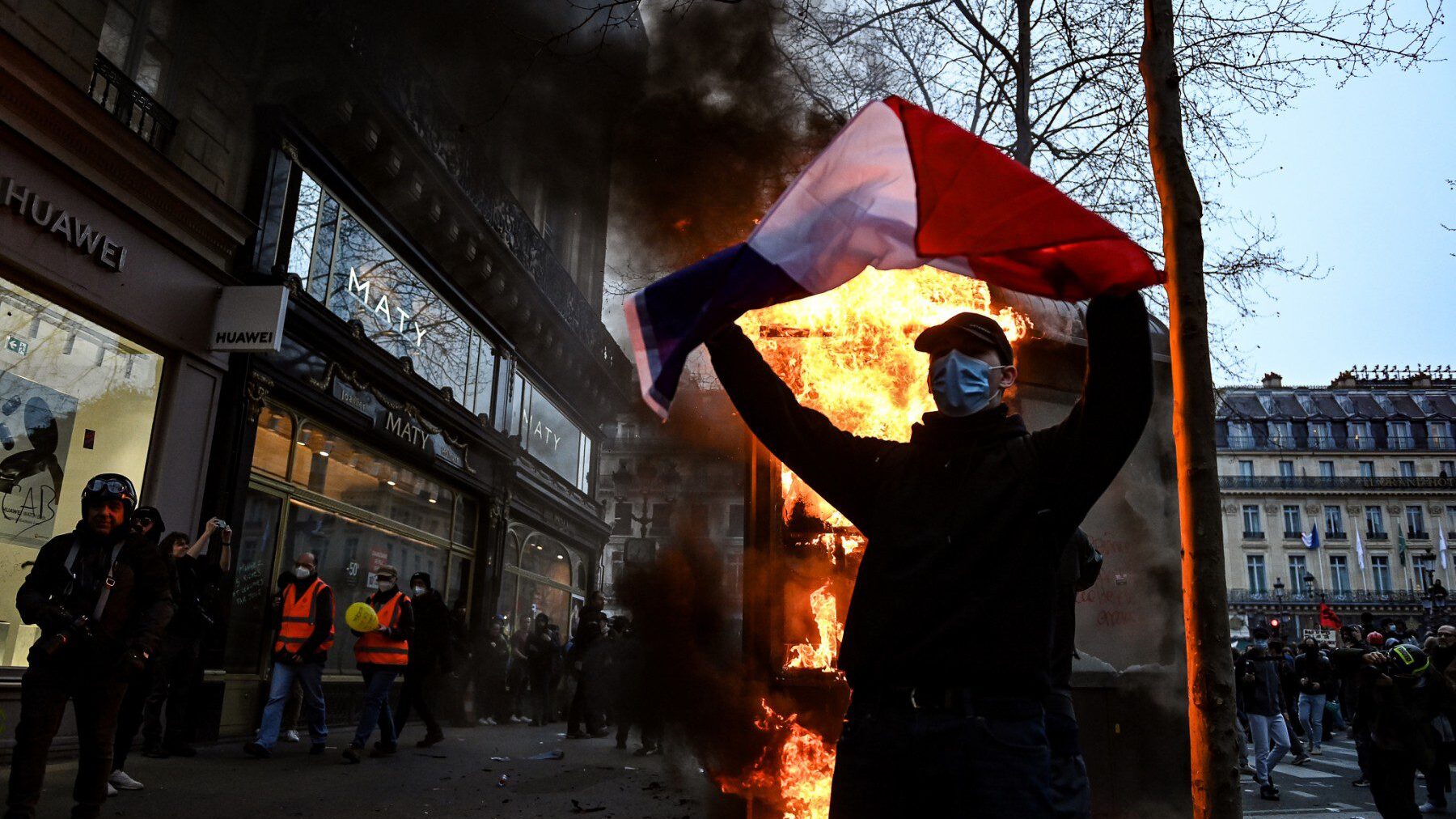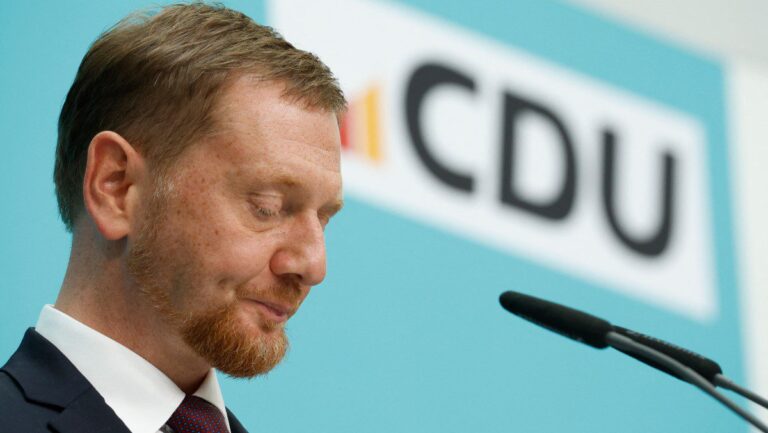The final adoption of the pension reform law on Monday, March 20th, has led to a resurgence of mobilisation across the country. The passing of the controversial law followed the failure of motions of censure intended to overthrow Élisabeth Borne’s government. On Thursday, March 23rd, a new day of mobilisation—the ninth since the law was proposed—turned violent in many parts of the country. For the time being, no end to the crisis is in sight.
The unions had predicted it: the forced adoption of the law using article 49.3 of the constitution would only strengthen the determination of the law’s opposition to defeat the reform in the streets. Since the beginning of the week, marches, blockades, demonstrations, and spontaneous gatherings have multiplied all over France.
The peak of the movement was reached on Thursday, March 23rd. The CGT, the main French trade union, counted 800,000 demonstrators in the capital—100,000 more than on the day of national mobilisation on March 7th—and a total of 3.5 million people across the country. The ministry of the interior counted 1.08 million demonstrators in France, including 119,000 in Paris. Demonstrations were this time also held in small and medium-sized towns in the provinces, which are not usually affected by this type of mobilisation, showing that the movement is becoming more and more serious and that the anger is increasingly shared.
The violence also increased. In Paris, clashes between police and demonstrators caused scenes of rare violence. The fire brigade had to intervene to put out numerous rubbish fires, notably in the Opéra district. In the big cities, similar incidents occurred: in Bordeaux, a fire was set at the door of the town hall.
🔥🇫🇷 ALERTE INFO – L’entrée de la mairie de #Bordeaux a été incendiée en marge des manifestations. (Rue 89) #reformedesretraites #greve23mars #grevegenerale pic.twitter.com/1aJHXz3pFw
— Mediavenir (@Mediavenir) March 23, 2023
In Lyon, clashes took place in the city centre. Images of the events have circulated abundantly on the web, eliciting vigorous reactions, both on the violence of the demonstrators and on the violent response of law enforcement, which recall the tensest moments of the Gilets Jaunes (yellow vests) crisis in 2017.
🇫🇷 ALERTE INFO – Situation extrêmement tendue à #Paris. De violents affrontements sont en cours avec les forces de l’ordre, qui doivent se replier sous une pluie de projectiles Place de l’#Opéra. (via @JulesRavel1) #manif23mars #manifestation pic.twitter.com/ssXymqjqkp
— Mediavenir (@Mediavenir) March 23, 2023
At 8:00 p.m. on Thursday, 58 people had been arrested in Paris, according to the police prefecture. A film sequence widely discussed on social networks shows a policeman collapsing after being hit by a paving stone.
Un policier s’effondre après avoir reçu un projectile sur la tête.#NonALaReformeDesRetraites #greve22mars #manif23mars #CensurePopulaire #GreveGenerale #ReformeDesRetraites pic.twitter.com/yPEzP74qJG
— La Luciole – Média (@laluciolemedia) March 23, 2023
Interior Minister Gérald Darmanin reported 123 injured police officers, while categorically denying possible systemic ‘police violence.’ The outbursts are only individual situations, “under the influence of fatigue,” he explained.
The country is plagued by all sorts of blockades and other incidents. Roadblocks are set up on many roads and around major cities by demonstrators. The spectre of petrol shortages, as in the autumn, is looming again: nearly a thousand stations were listed as being completely out of fuel on Friday, March 24th, due to the blockade of refineries, in particular, the Gonfreville refinery in Normandy that supplies Paris. The Paris airports of Roissy and Orly, which are running out of jet fuel, have had to implement restriction plans and are encouraging pilots to refuel at other supply points in Europe or North Africa.
On Wednesday, March 22nd, President Emmanuel Macron spoke on the subject of reform for the first time in several weeks in a TV address. His objective—to appease the French —failed completely, judging by opinion polls. According to the Odoxa institute,
more than three-quarters of French people (76%) were convinced by Emmanuel Macron. If they do consider that the president was ‘clear’ (54%) yesterday, the French still believe that he did not at all ‘understand their concerns’ (71%) nor ‘take the measure of the gravity of the situation’ (70%).
After his speech, 67% of French people think that the mobilisation against the pension reform should continue. They judge that
the violence and the excesses are the fault of the government (70%) and that they will get worse in the days to come (83%).
An unexpected consequence of the mobilisation is the cancelled visit of the King of England Charles III, scheduled for March 26-29. This was supposed to be the king’s first state visit abroad, and for several days, anxiety has been elevated for the protocol services of both countries. The British are worried about the ‘air of 1789’ that is blowing over France. Two days before the start of the visit, the definitive programme had still not been finalised. A gala dinner was planned in the Hall of Mirrors at the Château de Versailles, but there was no indication that the route from Paris to Versailles would be smooth.
The British authorities put pressure on their French counterparts: “I have complete confidence in the ability of the French authorities to ensure that the king will be safe and that he will have a positive view of France,” said British Foreign Secretary James Cleverly. “I think it would be disastrous for President Macron’s image if an incident occurred,” said an expert on the British monarchy for France Info. But on Friday morning, the Elysée declared that the visit was to be postponed.
For the moment, Emmanuel Macron does not show any intention of changing his course, leading the newspaper Le Parisien to draw a parallel between the French president and … Margaret Thatcher. But England is not France, and the situation in 2023 has little to do with the 1980s that the Iron Lady experienced.





